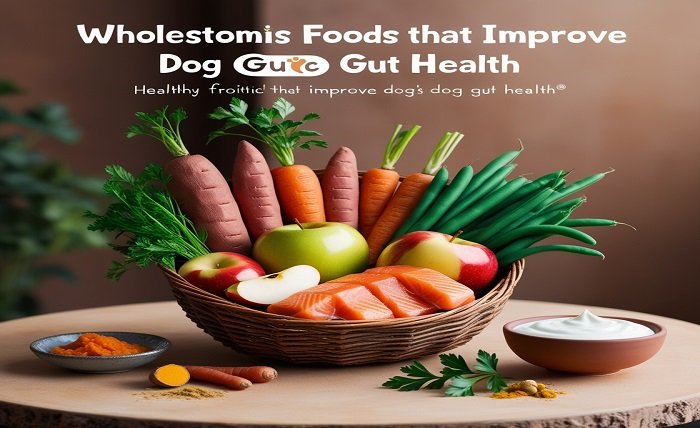A dog’s general health is greatly impacted by their foods to improve dog gut health, which affects everything from digestion to mood, immune system performance, and even skin health. Dogs, like people, depend on a balanced immune system and effective food absorption from a healthy gut flora. Trillions of bacteria, fungus, and other microbes live in the gut, where they aid in food digestion, create vital nutrients, and fend off dangerous infections. A dog’s stomach can flourish when it is in balance; when it is not, a number of health issues, like as skin disorders, allergies, and digestive discomfort, can arise.
The Value of Dogs’ Gut Health
It’s foods to improve dog gut health is important before delving into the foods to improve dog gut health systems. In addition to digesting food and absorbing nutrients, the gut contains a significant amount of the immune system. Infections and inflammatory diseases can be avoided by keeping the balance of good bacteria in the gut and limiting the overgrowth of bad bacteria.
Foods High in Fiber
One of the most crucial dietary elements for intestinal health is fiber. It aids in constipation prevention, stool quality improvement, and digestion regulation. Additionally, fiber is a prebiotic, meaning it promotes the growth of good bacteria in the stomach by feeding them. The following are a few of the foods to improve dog gut health:
Sweet potatoes
Dogs can benefit greatly from sweet potatoes’ high fiber content and important vitamins A, C, and B6. For dogs with sensitive digestive systems, this root vegetable is an excellent option because it is easy to digest and kind to the stomach. Before giving sweet potatoes to your dog, just bake or simmer them.
Foods High in Probiotics
When taken in sufficient quantities, probiotics—live bacteria—have positive health effects. They encourage the growth of good bacteria and aid in reestablishing the gut microbiome’s equilibrium. The following meals are high in probiotics and can improve the gastrointestinal health of your dog:
Yogurt
For puppies, plain, unsweetened yogurt is an top notch source of probiotics. It has live bacteria like Bifidobacterium and Lactobacillus that can support a balanced population foods to improve dog gut health. To be sure your dog doesn’t have a dairy sensitivity, start with minimal amounts of yogurt when adding it to their diet.
Kefir
Compared to yogurt, kefir, a fermented milk beverage, has a greater range of microorganisms. It’s full of good bacteria and can be a great supplement to your dog’s diet, particularly if they have digestive problems. To prevent extra sugars, use plain, unsweetened kefir, just like yogurt.
Fatty Acids Omega-3
Essential fats called omega-3 fatty acids are vital for lowering inflammation and enhancing intestinal health in general. They can lessen the symptoms of food allergies or inflammatory bowel disease (IBD) and help calm an irritated digestive tract. The skin and coat of your dog will also benefit from omega-3 fatty acids.
Fish (mackerel, sardines, and salmon)
Omega-3 fatty acids can be found in abundance in fatty fish, such as mackerel, sardines, and salmon. These fish can promote a healthy microbiota and lessen intestinal inflammation. foods to improve dog gut health, make sure to serve these fish cooked and with the bones removed.
Seeds of Chia
Chia seeds are a great addition to your dog’s diet because they are high in fiber and omega-3 fatty acids. Chia seeds can be added to homemade dog meals or sprinkled over your dog’s normal diet. To make sure the chia seeds are readily digested, soak them in water before serving.
Enzymes for Digestion
Digestive enzymes facilitate the breakdown of food and the absorption of vitamins. Adding foods high in enzymes to your dog’s diet will help them digest foods to improve dog gut health. Among these foods are:
A pineapple
Bromelain is an enzyme located in pineapple that allows break down proteins. Bromelain is a good diet for dogs with digestive problems since it can help reduce gas and bloating. Give your dog tiny portions of fresh pineapple, but steer clear of canned varieties since they have extra sugar.
Papaya
Papain, another digestive enzyme found in papaya, can aid in protein digestion and promote intestinal health. Papaya, like pineapple, is a natural digestive aid that can be consumed in moderation. Before giving your dog papaya, be sure to remove the seeds.
Conclusion
One of the best methods to foods to improve dog gut health is to support their intestinal health through their diet. You may encourage a healthy, balanced microbiome that promotes digestion, immunity, and general vigor by including foods high in fiber, probiotics, omega-3 fatty acids, and digestive enzymes in your dog’s meals. However, before making major dietary changes for your dog, especially if they already have health issues, always get advice from your veterinarian. You can make your dog’s life happier and healthier by feeding them the right foods and providing them with the necessary care.
FAQ
Can I give human probiotics to my dog?
Given that dogs and humans have distinct gut flora, it is best to speak with your veterinarian before feeding your dog human probiotics. If necessary, your veterinarian might suggest probiotic supplements tailored to your dog.
What signs point to a problem with my dog’s digestive health?
Diarrhea, constipation, vomiting, gas, bloating, a dull coat, and behavioral changes are all indicators of foods to improve dog gut health. seek advice from your veterinarian if your canine exhibits any of those signs and symptoms.
What foods should I stay away from to help my dog’s digestive system?
Indeed, foods like high-fat snacks, artificial additives, preservatives, and grains like corn and soy might upset your foods to improve dog gut health. Instead, concentrate on eating natural, entire foods. Learn more about: foods to improve dog gut health

